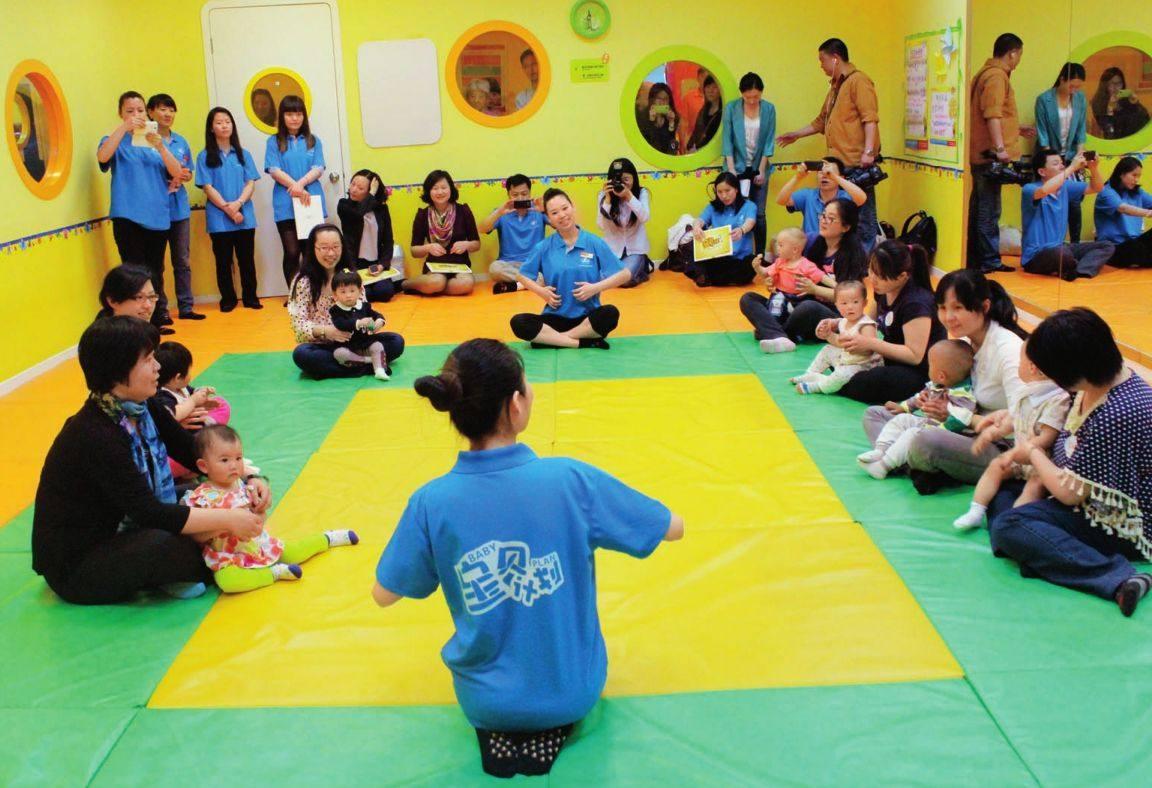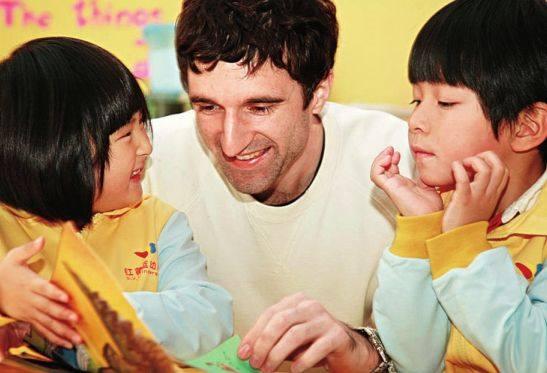Early Childhood Education Attracts Greater Interest
By staff reporter LU RUCAI
AFTER joining early childhood education classes my son has become well mannered and has leant to listen to instructions,” says Chai Fei. On the whole, her two-year-old son Borui has benefited immensely from the classes, run by RYB Education Institute, she says.
Early childhood education classes have taken off in China in recent years. Parents enroll their toddlers for different reasons: some want their kids to get an early start at school; others want their “only child” to interact with other children his or her age, and still others want early exposure to the English language. As for Chai Fei, she says she plans to learn from her sons classes. As a young mom born in the 1980s, Chai admits she lacks the parenting know-how to teach Borui herself.
High Demand
Lü Na, also born in the 1980s, says she grew up in a home where her parents were mostly absent. She has many siblings, and as money became tight she was sent off to live with her grandparents. She saw her parents only on weekends.
Having grown up by the sea in Dalian, Liaoning, Lü learned to swim – all by herself – when she was five years old. These days, even allowing a young child to walk down the street alone is unthinkable for most parents.
Lü visited a dozen kindergartens near the family home before deciding on one for her three-anda-half-year-old daughter. At the time all the public kindergartens were full up, and she was forced to go private. She ended up choosing RYBs kindergarten.“I went for RYB because its a chain kindergarten with a good reputation. Its operations are large-scale– it knows what its doing – and classes are standardized,” she says.
Tuition is RMB 2,900 per month at RYB, which is about two thirds the average monthly salary (RMB 4,672) of Beijing residents. Lü isnt daunted by the cost, however; for her, as for most families in Chinas big cities, pulling out all the financial stops for a childs education is considered a worthwhile – and necessary – expense.
In China, it is common for grandparents to take care of children in their first few years of life. In many families, both parents work; often, its retired grandparents who have both the time and energy to raise the kids. A recent survey by Babytree.com, a leading Chinese parenting website, shows that grandparents help raise children in about 60 percent of Chinese families.
But there are also problems with this situation.“Grandparents often spoil their kids; they are willing to buy them everything,” Lü says. She recalls her parents taking care of her daughter and buying her fried chicken and chips at KFC everyday on their way home from school.
Lü read up on child development in a number of books, but when she explained the theories to her parents, she was greeted with blank stares. In the end, she decided to raise her daughter by herself. Sending her daughter to early childhood education was also her decision; she recognizes it as helpful for both socializing children and making sure they pick up good habits early.
A survey on parenting conducted by the Womens Federation of Jiaxing City of Zhejiang Province shows that market demand for early childhood education is huge. About 53.3 percent of parents in Jiaxing believe it important, and 39.3 percent believe it relatively important, for children aged zero to three years old.
As for staff and teachers at kindergartens and other early childhood education institutes in the city, admittedly a biased group, the number of supporters of early education is much higher: 75.2 percent believe it essential for toddlers to get an early education, and 94.4 percent said kids who receive early childhood education would perform better once they enter the compulsory school system.
Other surveys from around the country show similar results. Market demand for early children education is strong wherever one looks in China. In Jiaxing, for instance, over 80 percent of zero-to-threeyear-old children stay at home under the care and education of their grandparents; less than 20 percent attend early education classes. There are simply not enough places in the classes, and demand is much stronger than supply.
The Beijing Development Report on the Rule of Law (2011) shows that at the end of 2011 there were 1,305 kindergartens in Beijing, with another 302 branch kindergartens. Among them were 1,010 public kindergartens enrolling 311,000 children. But there were at least 60,000 children unable to get places in preschool education programs, which means Beijing currently lacks at least 300 kindergartens.
From Luxury to Necessity
Wang Jianli, vice president of the RYB Education Institute, recently went to the U.S. with staff from the National Health and Family Planning Commission to learn about the countrys infant early stage development practices. During the 21-day trip, her delegation visited the World Bank and the United Nations International Childrens Emergency Fund (UNICEF), and went to top-flight universities such as Harvard and Columbia to speak to researchers. They also conducted their own investigations at childcare admin-istrations in California and New York City, and at the Early Childhood Association and the Childrens Aid Association.
American institutions emphasis on a well-rounded education impressed Wang greatly right from the start. On coming back to China, she wrote about her observations in a lengthy piece for RYBs newsletter.
Wang says RYBs focus was on school-age children when the institute was founded in 1998. But over time, she says her colleagues realized the huge demand – and need – for promoting childrens early development. “There are 16 million newborns annually in China. Parents are more and more aware of the importance of early education,” she says.
Babytree.coms survey of more than 3,000 mothers reveals that parents who send their children to early education classes have high expectations: 81 percent hope their children learn to communicate with people in a confident and easy manner; 77 percent want their toddlers to develop good habits and the ability to look after themselves, while 68 percent believe their children will be “smarter” thanks to the early schooling. Mothers themselves hope to acquire expert knowledge on the early development of a childs intelligence through institutes such as RYB.
Wang says there are many benefits to an early education. These include providing opportunities for communication among kids, developing social personalities, fostering emotional development, encouraging group participation, and heightening language skills, reading ability and basic knowledge of mathematics and other vital subjects. Another advantage is institutes offering parents an example of a scientific way to raise children on an individual level. Tiger-mom style education may bring up prodigies in rare cases, but for all kids, not just the geniuses, not imposing ideas and allowing children to find their own strengths is a much better model.
The tiger-mom idea dies hard, however. Much effort is spent by institutes such as RYB to educate and train parents and child minders. RYM now runs more than 600 parent-child “gardens” across the country, their purpose to educate both children and parents in a common setting.
One fundamental problem with early childhood education a few years back was that it rarely connected with further schooling. Children would learn one thing at three years old, only to relearn it a year or two later. Wang says RYB has tackled the problem by integrating kindergartens, for three to six-yearolds, with zero-to-three-year-old centers. This has been beneficial for the quality of kindergarten education as a whole: as private players have entered the market, competition has increased.
Private kindergartens charge more, but they justify the added cost with more personalized class arrangements, favorable pupil-teacher ratios, broader afterschool care services and flexibility of admissions.
Besides offering regular subjects, private kindergartens, unlike public ones, also provide kids with elective interest classes such as music, dancing and English.
Within the private system itself there are many differences in the quality of instruction and services. Wang says it is important that educators are up to date on the latest international research into early childhood education, and that they incorporate research findings into their teaching techniques.“We always pay attention to research. We even do a fair bit ourselves, rather than just copy concepts and methods from abroad,” she says.
RYB hires a research staff of 40 to investigate and innovate tried-and-true teaching techniques. This makes the institute a leader in educational innovation nationwide. In 2011, for instance, it came out with the market-leading Zhudou educational box set. It contains DVDs, CDs, a painting book, a cognitive reading book, other learning materials and educational toys. For Wang, products such as the box set, and indeed early childhood education as a whole, are a necessity, not a luxury.
Government Participation
RYB has also teamed up with local governments to improve the quality of teacher instruction and the skills of child minders. One such local government is that of Tianjin, a coastal municipality two hoursdrive from Beijing.
The Tianjin Children Early Education Center was jointly established by the Tianjin Health and Family Planning Commission and the citys Teachers Association. Its grounds were opened in June 2011 and cover an area of more than 1,000 square meters. The government chose RYB Education to carry out the administration and management of the center. For the first half year of operations, the center bought, at the governments expense, the services of RYBs instructors and provided free instruction and related services to families in the city. By the end of 2012, the center had provided instruction to more than 10,000 infants through parent-child activities, communitybased parent-child classes and other programs.
This year the Tianjin center is continuing its activities, but they are no longer free. Classes now cost RMB 30-45. Fees are subsidized by the government to encourage broader participation. Private schools often charge in excess of RMB 150 for similar services.
In Hebei Provinces Shijiazhuang RYB has also worked with the local government to provide services similar to those it offers in Tianjin. The publicprivate model for early childhood education works, and its prevalence is growing.
Many local governments, such as that of Suzhou, Jiangsu Province, have begun carrying out programs offering free early instruction and reading materials to children and parents. Beijing has worked with RYB on its “Baby Plan” project and set up an infant education center in each of its 16 districts and counties.
Wang points out that local governments, having grown more aware of the benefits of early childhood education, proactively engage in research. They have been courting private education providers in their research programs, an acknowledgement that private players have been in the sector longer than their public equivalents.
“Baby Plan” is one of a slew of measures initiated by the government that aim to improve the welfare of families with infants aged zero to three. On May 5 this year it held its first free parent-child activity for 400 infants and their parents, while 1,000 more were waiting to fill vacant slots, according to registration statistics on the official Weibo (Chinas twitter-like service) of the Beijing Municipal Health and Family Planning Commission. By years end, an estimated 12,000 infants will have attended the free activities and benefited from expert educators advice.
Shi Yanlai, founder and president of the RYB Institute, says Baby Plan is a vital step forward in pushing for public-private partnerships in the field of education. Such partnerships are rare in high school and university settings in China.
In 2011 the Beijing municipal government kicked off a three-year program that will eventually see an additional 75,000 places for infants in kindergartens. The plan should go a long way towards meeting the shortage of early childhood education centers in the capital.

